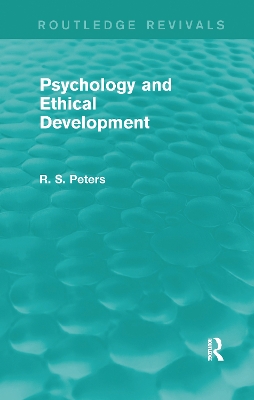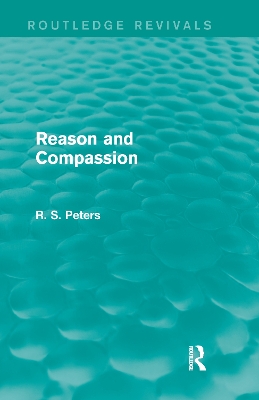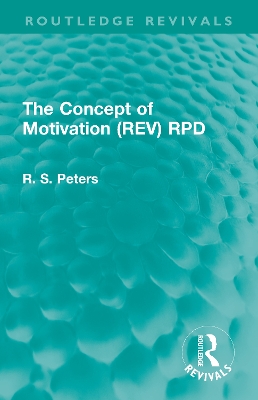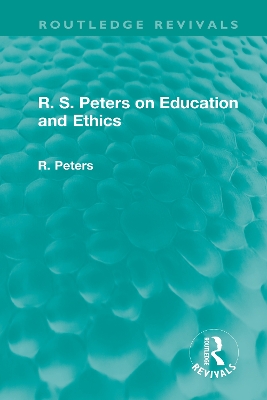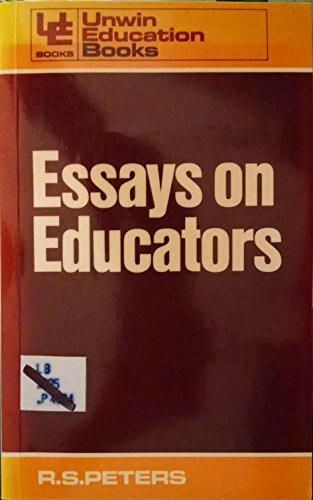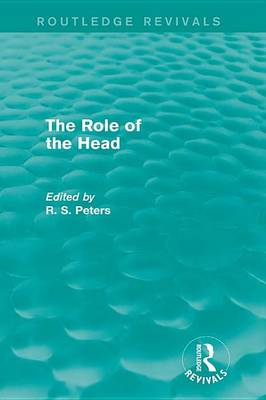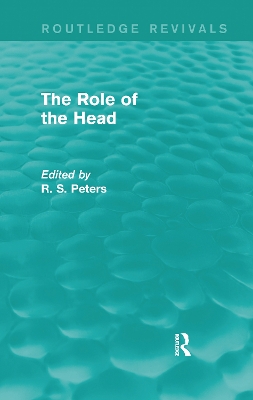Routledge Revivals: R. S. Peters on Education and Ethics
9 total works
First published in 1974, this book presents a coherent collection of major articles by Richard Stanley Peters. It displays his work on psychology and philosophy, with special attention given to the areas of ethical development and human understanding.
The book is split into four parts. The first combines a critique of psychological theories, especially those of Freud, Piaget and the Behaviourists, with some articles on the nature and development of reason and the emotions. The second looks in historical order at ethical development. The third part combines a novel approach to the problem of understanding other people, whilst the fourth part is biographical in an unusual way.
The volume can be viewed as a companion to the author’s Ethics and Education and will appeal to students and teachers of education, philosophy and psychology, as well as to the interested non-specialist reader.
First published in 1959, Authority, Responsibility and Education focuses on the philosophy of education and is concerned with the question of moral education. It was originally based on talks delivered mainly on the Home Service and Third Programme of the BBC between April 1956 and January 1959 but, due to its wide appeal and popularity, it was revised to include work from a further 10 years of the author's teaching and experience in the subject.
The book is written in three parts on authority, responsibility, and education, and uses several theories, including those by Marx and Freud, to achieve his aims. Although originally published some time ago, the book considers many questions that are still relevant to us today.
First published in 1973, Reason and Compassion showcases a collection of lectures by Professor Richard S. Peters concerned primarily with the moral position, based on compassion and on the use of reason, which is critical to code-encased moralities. He reacts to the idea that whilst many people are sympathetic towards protests against an established moral code, they are reluctant to align themselves with modern forms of nihilism, subjectivism and romantic revolt.
The work studies the implications for moral education and takes account of modern work ethics, development psychology and philosophy of religion. It presents its findings in a way which can be appreciated by specialists and non-specialists alike. By making a distinction between the form of the moral consciousness and the content of particular moralities, Peters reconciles the development approach of Piaget with the approaches of other schools of thought, including the Freudians and social learning theorists.
First published in 1966, this book was written to serve as an introductory textbook in the philosophy of education, focusing on ethics and social philosophy. It presents a distinctive point of view both about education and ethical theory and arrived at a time when education was a matter of great public concern. It looks at questions such as 'What do we actually mean by education?' and provides a proper ethical foundation for education in a democratic society. The book will appeal to both teachers and students of philosophy as well as education.
First published in 1958 with a second edition in 1969, The Concept of Motivation looks philosophically and psychologically at the idea of motivation in order to explain human behaviour. Chapters cover types of explanation in psychological theories, motives and motivations, a look at Freud’s theory, drive theories, and regression to hedonism. Despite its original publication date, the book explores topics which are still of great interest to us today.
‘This is indeed an outstanding book; perhaps the best study in philosophical psychology to appear since Ryle and a work which […] will remain a classic for many years’ Philosophy
R. S. Peters on Education and Ethics reissues seven titles from Peters' life's work. Taking an interdisciplinary approach, the books are concerned with the philosophy of education and ethics. Topics include moral education and learning, authority and responsibility, psychology and ethical development and ideas on motivation amongst others. The books discuss more traditional theories and philosophical thinkers as well as exploring later ideas in a way which makes the subjects they discuss still relevant today.
First published in 1981, Essays on Educators is a collection of essays on a variety of themes relating to Great Educators. The book is not only an exposition of the thought of these educators but a collection of critical essays in which their writings are used selectively to raise problems of permanent educational interest and importance.
The first part explores the education of the individual in society and the development of reason. The second looks at progressivism and tradition in education and includes a critique of Herbert Spencer's Essays on Education, which are little known. The third part of the book is concerned with tackling educational problems from an interdisciplinary standpoint.
First published in 1967, this book looks at what the role of a headteacher should be, challenging the traditional views of the head and the authoritarian structure of schools. Contributors explore new concepts of the head’s role in school and authors include both theorists and headteachers coming from various backgrounds including those that are historical, philosophical, sociological, and practical. The book also benefits from some more down-to-earth musings by heads on the job.
The collection as a whole offers a stimulating variety of views on a subject which is of importance to all teachers, as well as those concerned with management and decision making. Although first published some time ago, it explores issues that are ever present today.
First published in 1967, this book looks at what the role of a headteacher should be, challenging the traditional views of the head and the authoritarian structure of schools. Contributors explore new concepts of the head’s role in school and authors include both theorists and headteachers coming from various backgrounds including those that are historical, philosophical, sociological, and practical. The book also benefits from some more down-to-earth musings by heads on the job.
The collection as a whole offers a stimulating variety of views on a subject which is of importance to all teachers, as well as those concerned with management and decision making. Although first published some time ago, it explores issues that are ever present today.
